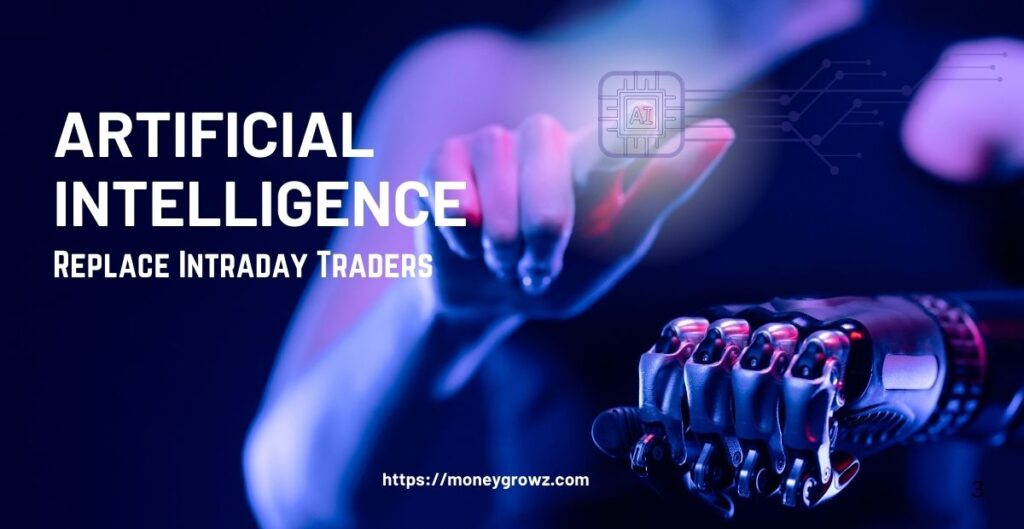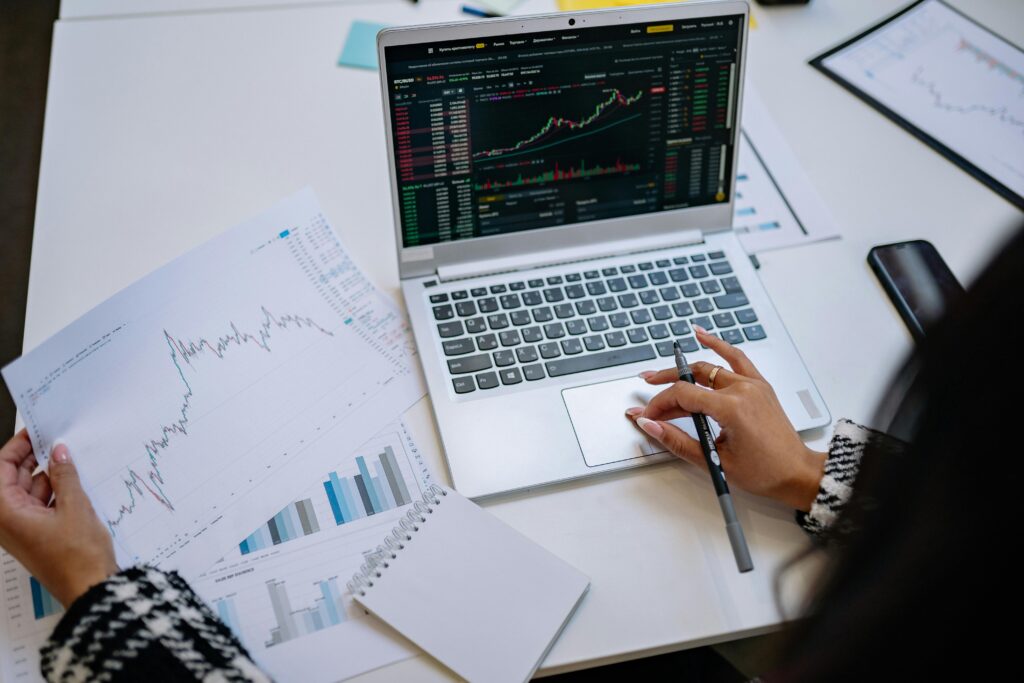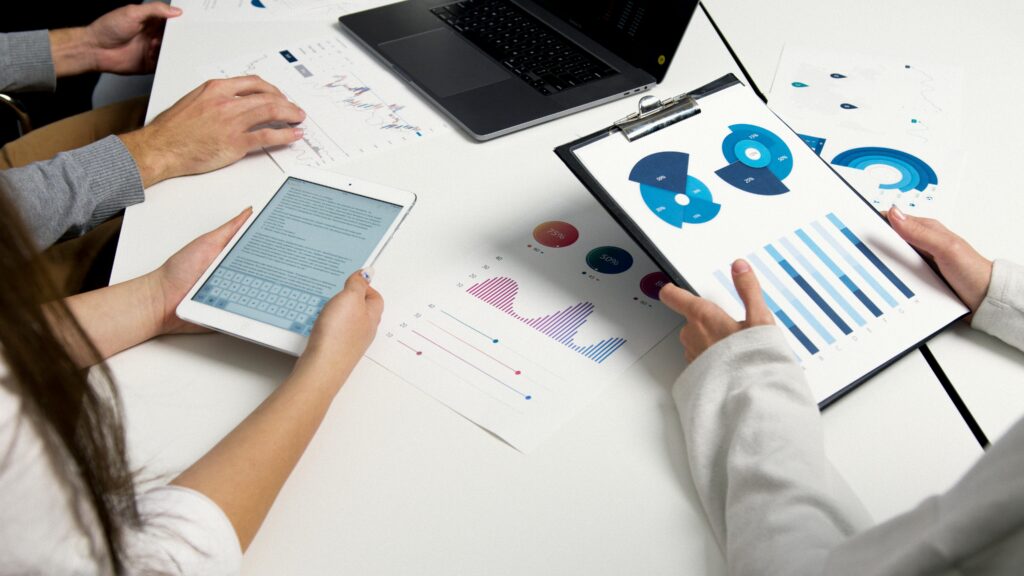Intraday trading is an intense and fast-paced activity that demands quick decision-making, thorough market analysis, and effective risk management. With the growing influence of Artificial Intelligence (AI) in financial markets, a major question arises: Will AI completely replace human intraday traders?
To answer this, we need to explore the capabilities of AI in stock trading, its limitations, and how human traders can adapt to this evolving landscape.
The Role of AI in Intraday Trading
AI has already revolutionized stock markets by enhancing speed, accuracy, and efficiency. The introduction of algorithmic trading, machine learning, and automation has made AI an indispensable tool for traders.
One of the most significant applications of AI in trading is algorithmic trading. AI-powered algorithms analyze massive amounts of market data in real-time and execute trades based on pre-defined strategies. Unlike human traders, AI can process multiple indicators simultaneously and make instant decisions without hesitation. These algorithms eliminate emotional bias, which often leads to irrational trading decisions in humans.
Another crucial aspect of AI in trading is machine learning and pattern recognition. AI systems are capable of identifying trends and market patterns that are not easily visible to human traders. Machine learning models analyze historical price movements, chart patterns, and technical indicators to predict future market trends. This gives traders an advantage in making more informed decisions.
Additionally, automated trading bots powered by AI have become popular among traders. These bots monitor multiple stocks across different markets, execute trades based on predefined conditions, and adjust strategies dynamically. Since AI operates without fatigue, it ensures that no trading opportunity is missed.
AI also plays a vital role in risk management and sentiment analysis. AI-driven tools automatically set stop-loss and take-profit levels, helping traders minimize their losses. Moreover, sentiment analysis powered by AI scans news articles, financial reports, and social media to assess the overall market sentiment. This helps traders understand how public perception and major events might impact stock prices.
While AI has significantly enhanced trading efficiency, it is still not capable of completely replacing human traders.
AI-powered trading is legal in India
AI-powered trading is legal in India but is strictly regulated by SEBI to ensure market stability and fairness. Traders and brokers must get SEBI and stock exchange approval before deploying AI-based trading algorithms. Institutional traders, hedge funds, and SEBI-registered brokers can use AI-driven trading strategies. Retail traders cannot use unregulated API-based algo trading or third-party trading bots. Exchanges like NSE and BSE review algorithms to prevent market manipulation and excessive volatility. AI trading systems must include risk management measures like stop-loss and order throttling. SEBI prohibits misleading claims of guaranteed profits from AI-based trading. Unauthorized AI trading can lead to penalties or restrictions from SEBI. Retail traders can only use AI tools provided by SEBI-approved brokers. AI trading in India is growing, but regulations ensure responsible usage.
Limitations of AI in Intraday Trading
Despite AI’s ability to process vast amounts of data and execute trades at lightning speed, it has certain limitations that prevent it from fully replacing human traders.
One of the biggest challenges AI faces is market unpredictability. While AI relies on historical data and pre-programmed strategies, financial markets are often influenced by unexpected events such as economic crises, geopolitical tensions, corporate scandals, or regulatory changes. These unpredictable events can cause sudden market movements that AI models may not anticipate. Human traders, on the other hand, can react to these events based on experience and intuition.
Another major limitation is the psychological aspect of trading. Experienced traders often develop an instinct for market movements based on years of experience. AI, no matter how advanced, lacks human intuition and emotional intelligence. While emotions like fear and greed can sometimes lead to poor trading decisions, they also allow traders to sense opportunities that AI might overlook.
Furthermore, AI operates within pre-set rules and conditions, making it less flexible in adapting to sudden changes in market behavior. Human traders, on the other hand, can modify their strategies in real-time based on new market conditions, unexpected news, or personal insights.
AI is also not 100% foolproof. There have been instances where AI-driven hedge funds and trading systems have suffered massive losses due to incorrect predictions or over-reliance on past data. Markets are constantly evolving, and strategies that worked in the past may not necessarily work in the future. While AI is excellent at recognizing patterns, it cannot guarantee success in all market conditions.
For more details on intraday trading, click here
The Future: AI and Human Traders Working Together
Instead of replacing human traders, AI is more likely to act as a powerful assistant, helping traders make better and faster decisions. The future of intraday trading will likely be a combination of AI-driven automation and human expertise.
Traders can leverage AI for market analysis, risk management, and executing trades more efficiently, but they should still rely on their judgment, experience, and adaptability to navigate unpredictable market conditions. AI can be used to automate repetitive tasks, scan stocks for trading opportunities, and provide real-time insights, allowing traders to focus on strategy development and risk assessment.
Ultimately, traders who embrace AI tools while maintaining control over their trading decisions will have a competitive advantage. AI is not here to eliminate human traders but to enhance their efficiency and improve overall trading outcomes.
Brokers in India provide algorithmic trading services with AI and automation features
Several SEBI-approved brokers in India provide algorithmic trading services with AI and automation features. Zerodha Kite offers APIs for traders to build and deploy their trading algorithms. Upstox Pro provides API-based access for executing algo trading strategies. Alice Blue ANT allows users to integrate custom trading algorithms with its platform. 5paisa Trade Station supports algorithmic trading with multiple subscription options. Samco StockNote offers real-time data and execution capabilities for algo trading. These platforms ensure compliance with SEBI regulations and require exchange approval for algorithm use. Retail traders cannot use unregulated third-party algo trading bots. SEBI mandates strict risk management measures in algorithmic trading. Traders should choose SEBI-registered brokers to avoid legal issues. Understanding the risks and strategies of algo trading is crucial before starting.
Final Thoughts
AI is undoubtedly transforming the world of intraday trading, making it faster, smarter, and more data-driven. However, it is unlikely to completely replace human traders anytime soon. While AI excels at speed, accuracy, and emotion-free decision-making, human traders still hold the edge in adaptability, intuition, and strategic thinking.
The most successful traders in the future will be those who combine AI technology with human intelligence. By leveraging AI-powered tools while maintaining a personal touch in trading decisions, traders can achieve the best of both worlds.
Would you trust AI to trade on your behalf, or do you prefer to have full control over your trades? Share your thoughts in the comments!
Stay connected! Subscribe for more insights and share your thoughts in the comments!



